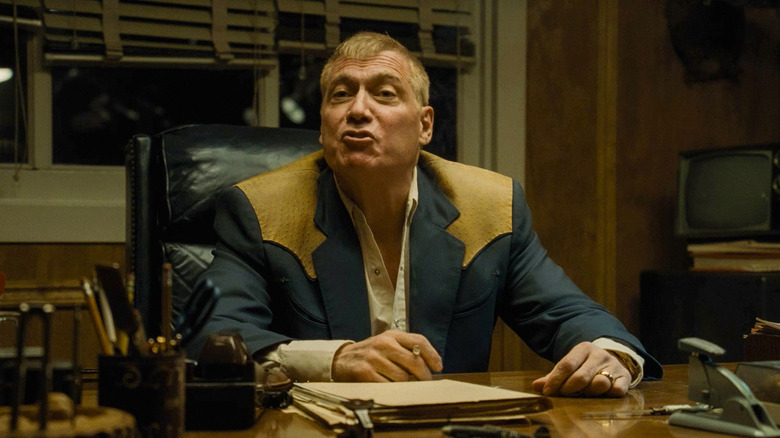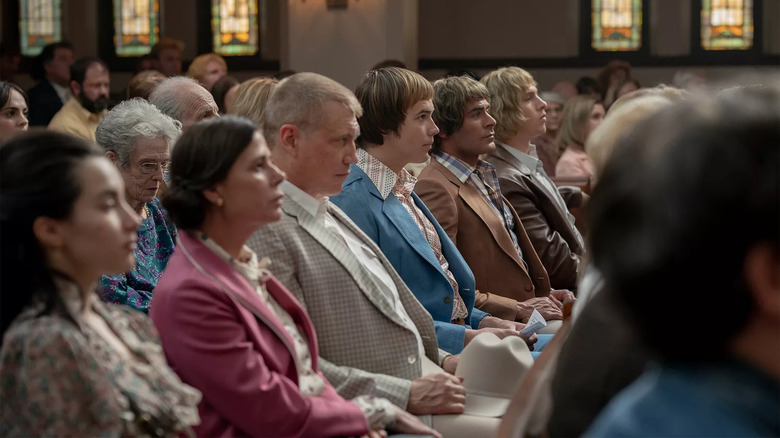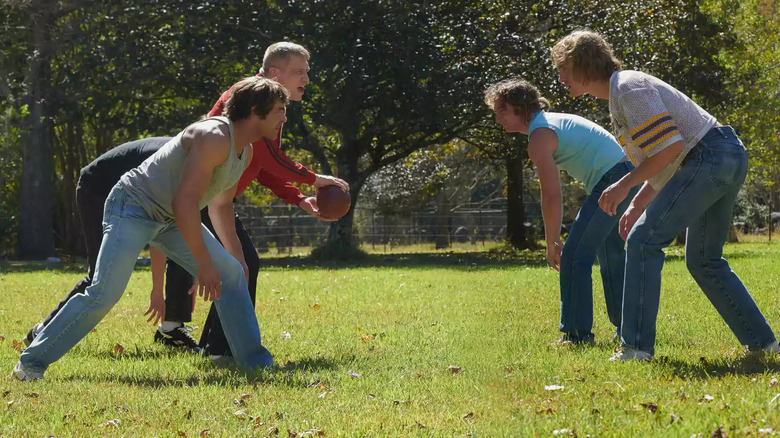A Deleted Iron Claw Scene Would Have Stripped Fritz Of His Tough Exterior
This post contains spoilers for "The Iron Claw."
Of all the characters in the wrestling biopic "The Iron Claw," it's patriarch Fritz Von Erich (Holt McCallany) who comes out looking the worst. As his sons slowly but surely fall apart in their pursuit of wrestling (and their pursuit of their father's approval), Fritz is right there egging them on, pushing them further and further toward the brink.
Although the real-life Kevin Von Erich still considers his father to have been an "honorable, good man," the rest of the world considers Fritz to be a bit of a villain, holding him at least a little bit to blame for three of his sons (not just two like in the movie) dying by suicide, and a fourth dying from the stress wrestling and drugs put on his body. The movie itself follows along with this view, giving us a Fritz who pushes forth a limited, poisonous view of masculinity onto his sons. He teaches them that being strong is the most important thing and that being emotionally open is unmanly.
Most importantly, he acts like more of a coach than a dad and blatantly puts his kids in competition with each other. "Now we all know Kerry's my favorite, then Kev, then David, then Mike, but the rankings can always change," he says nonchalantly early on. It's an approach that seems to work out for the family in the first half of the movie, as the brothers become extremely successful wrestlers in their own right. Still, it fully reveals itself as poisonous in the second half, where the Von Erich kids start dropping like flies. Despite all the tragedy, Fritz never changes his worldview. Even when Kerry is clearly suicidal, he doesn't take the time to look after him.
The film almost softened him up a bit
In an interview with Variety, McCallany described a cut scene that showed a softer side to his character:
"After my son Mike develops toxic shock syndrome and falls into a coma [...] Fritz goes into the chapel to have a conversation with God, saying, 'What did I ever do to deserve to be visited with such tragedy in my family?' It's not long, but it was powerful. [Director] Sean [Durkin] determined the scene would be eliminated. I fought for it but lost that battle."
This wasn't the only one of Fritz's scenes to be cut; for the sake of keeping the movie focused, a ton of other real-life details had to be cut or glazed over. It was "difficult" for McCallany, as he had a lot of sympathy for Fritz and pushed for the movie to treat him in a slightly more nuanced light. "I wanted the audience to understand Fritz is a tremendously complex man," he said. "There was a vulnerable side. When his wife left him after 40 years of marriage, he was bereft and died a few years later."
The divorce was also never mentioned in the movie, nor were there any scenes where Fritz's softer side won out. His vulnerability was instead shone in smaller, subtler moments, which audiences have to look for under his constant gruff exterior. It's a sensible choice considering that Kevin (Zac Efron) is the main character; when he attacks his father after Kerry's death, it's supposed to be a cathartic moment of built-up righteous anger. It's also more dramatically effective since our view of Fritz has mostly been limited to Kevin's perspective.
The trouble with biopics
Although generally well-received, "The Iron Claw" has drawn plenty of criticism for its changes to the real-life story. The decision to cut out an entire brother who also died by suicide feels particularly callous to some, even though the writers' reasoning behind the cut (that it would've been too dark and repetitive) is pretty sympathetic. The movie's also drawn some mild criticism from the real-life Kevin Von Erich, who still remembers his father fondly. "He comes off pretty rank in this movie," Kevin told the Talk is Jericho podcast. "You would think that the pressure that Fritz put on us is why my brothers would [die by] suicide."
This particular line of criticism hasn't been as popular, as most people familiar with the story believe that Kevin's view of his father is softened by familial love and nostalgia. Compared to plenty of other documentaries and reporting on the family, the more popular critique of "The Iron Claw" is that the movie's actually a little too kind and forgiving to Fritz. That said, Kevin's criticism speaks to the inherent messiness of making a movie about people who are still in living memory and have family members who don't want to see them disparaged.
Much like Vili Fualaau's criticism of "May December" (which was partly inspired by his and the late Mary Kay Letourneau's real-life story) or how J. Robert Oppenheimer's grandson dislikes the poisoned apple scene in "Oppenheimer," there's a larger conversation to be had about what's more important: making compelling art or being accurate to actual events? "The Iron Claw" clearly picked the former, which Kevin Von Erich understands despite his reservations. "It's a movie. It's made for entertainment," he said. And when looked at the movie just through that lens, it certainly succeeds.


